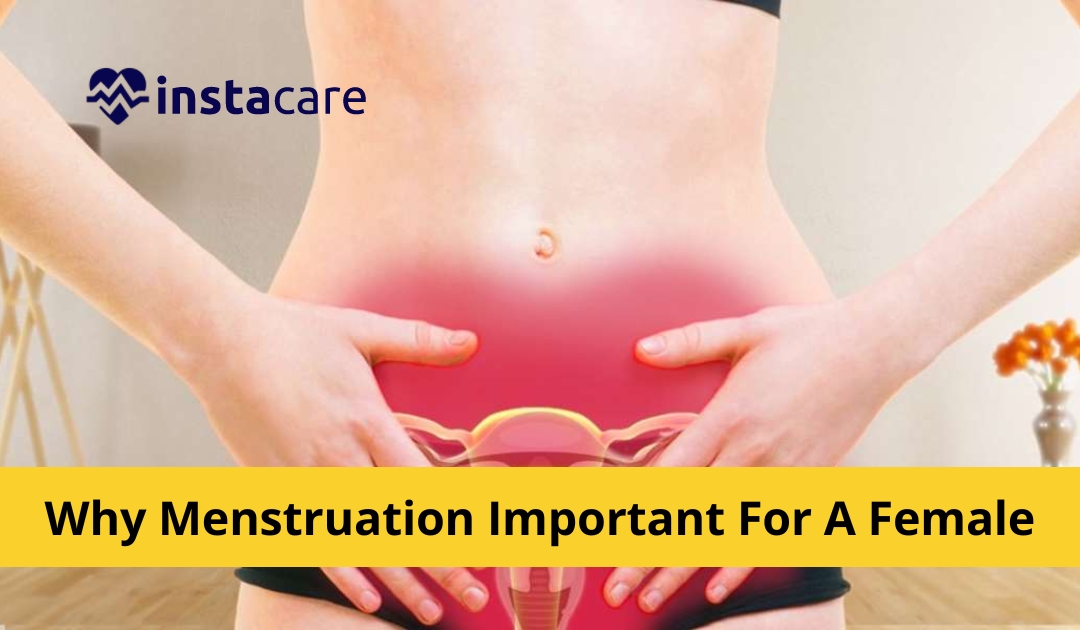The female menstrual cycle has been parts of our lives as women since time immemorial, yet so many of us don’t really understand the importance behind it. From addressing hormone imbalance to improving overall health and wellbeing, there are countless reasons why menstruation is critical for a woman’s life. In this blog post we will be exploring five key points that summarize why periods are so important for all females.
Being aware and educated on our monthly cycles can help us make better health choices more symphathetically tailored towards our current states on any given day or week in the cycle. Read ahead to grasp a deeper understanding of why your body goes through such an extensive process every single month - from a medical standpoint and beyond!
What is menstruation?
Menstruation is a natural and normal monthly bodily process that impacts people who menstruate. It signals the body's readiness for possible pregnancy. During this time, tissue from the lining of the uterus is shed from the body through the vagina. This can last anywhere from a few days to up to a week, depending on an individual's unique cycle.
Common physical changes may include cramps, bloating, headaches, or fatigue. It is important to practice good menstrual hygiene by changing your pads or tampons regularly and cleaning your genitals thoroughly during each cycle. Additionally, it is important for people to educate themselves about risk factors associated with their menstruation in order to maintain good health and safety throughout their cycles.
What’s the menstrual cycle?
The menstrual cycle is a natural and essential process of the female body. During the menstrual cycle, hormones trigger an egg to be released from an ovary, travel through the fallopian tube, and hopefully become fertilized. If the egg is not fertilized, then it is not needed by the body and therefore it and the uterus lining will shed during menstruation.
The average menstrual cycle lasts 28 days although variations are completely normal. It's important to understand what’s happening in your body during your menstrual cycle, as this knowledge can help answer many questions relating to a woman’s health, fertility, and well-being.
How do periods work?
It's a topic not often discussed openly, but understanding how periods work can be an empowering experience. A period is the regular shedding of the lining of the uterus, or endometrium, which happens as part of the menstrual cycle. This occurs every month in women and girls aged between 12 to 52 years old roughly. There are various signs that mark the start of a period such as cramping, pelvic pain, bloating and changes in mood.
Depending on your menstrual cycle you may experience these symptoms first then menarche – your first period – will follow or they can show up at the same time alongside bleeding that usually lasts between 3 to 7 days. During this time blood and tissue will exit through your vagina. It is important for menstruators to take care of themselves during their periods in order to feel their best.
When in life do periods start and stop?
Puberty marks the beginning of a woman's reproductive system, and therefore the start of her menstrual cycle. On average, periods start between ages 12 and 14, but it can vary depending on the individual. During a woman's life, hormones will make their levels fluctuate which cause the menstrual cycle to be regular or less frequent.
After menopause usually experienced around age 51, women will no longer menstruate due their ovaries having stopped producing eggs. This means that once in menopause, a woman no longer has to worry about dealing with a period each month.
The ‘normal’ period
The 'normal' period is a term given to the 60-year-long period between the end of world war ii and the beginning of the global war on terror. During this time, global events followed a predictable pattern, with urbanization gaining momentum, aid becoming increasingly available, and economic development becoming normalized across most parts of the world - all while nuclear weapons were placed as a deterrent against direct military intervention.
This period was particularly characterized by widespread peace and relative affluence. What many don’t realize is that this period may have never even existed if not for the efforts of countless people who worked tirelessly to create it - from leaders working to maintain order, activists pushing for change, and individuals making small every day choices that adhered to principles of tolerance. As such, we must remember our past and learn from it, in order to ensure that future generations can enjoy periods of normalcy as well.
Do transgender guys get a period?
The answer to this question isn't straightforward. Transgender guys who have undergone gender affirming hormone treatments, like testosterone therapy, will usually stop having a menstrual cycle--this is similar to cisgender women who take birth control pills. While some transmasculine individuals may still experience a period after taking testosterone for extended periods of time, the heavy bleeding associated with it usually stops within a few months.
View More: Can You Take Bath During Periods Pros And Cons
However, transgender guys who do not use hormone treatment may still experience menstrual cycles. Gender identity has no bearing on whether someone gets a period--it all depends on their biological sex and hormones. Therefore, if a transgender man is assigned female at birth and still menstruates, they could still technically get a period in the same way that any other cisgender or non-binary person assigned female at birth would.
Why is menstruation important for a female?
Menstruation is an equally important part of a female's life as it is for any other human being. It is the process through which she can become pregnant, another key role in the continuation of the human race. Menstruation is a sign that her body has matured enough to sustain a fetus for nine months and reproduce in an ideal manner. It also helps her maintain her health since regular menstrual cycles indicate hormonal balance which plays a strong role in general physical wellness.
Menstruation gives insight into a female's reproductive state such as whether her ovaries have started releasing eggs or not, allowing doctors to diagnose health conditions more accurately. Finally, menstruation serves as an opportunity for women to be conscious of their body and understand its needs when it comes to sustenance and rest during the cycle.
1- menstruation is a natural process that helps keep a woman healthy
Menstruation is an important, natural process that helps maintain the health and wellbeing of women everywhere. It all starts with the release of hormones during puberty, which prepares a woman's body for pregnancy. With each monthly cycle, the hormones prepare the uterus for potential fertilization and trigger production of menstrual fluids that line the walls of the uterus and help nourish any implantation of a fertilized egg should it occur.
If pregnancy does not occur, the menstruation signals to a woman's body it is ready to start over again with another hormone-driven cycle, enabling her to reproduce later on if desired. Without this vital process, many female reproductive functions would be impaired; hence why it’s important women take care of their health throughout adulthood by engaging in regular checkups and following good nutrition and exercise practices.
2- menstruation provides an opportunity for self-reflection and growth
Menstruation provides female individuals with an incredible opportunity to engage in self-reflection and growth. While many approach menstruation with trepidation, believing it is an unwelcome event, there are several why why it is important for a female’s body and why the flow provided by it should be embraced as a natural occurrence.
By reflecting on the experience of menstruation and its cyclical nature, women can gain insights into their well-being, physical health, and sense of connectedness. It is also inevitably linked to creativity and can provide a chance for self-care rituals that nourish mind and body. Ultimately, menstrual cycles are seen as providing some of life’s most vital lessons — from gaining greater appreciation of our bodies to understanding why certain feelings arise. Therefore, embracing menstruation as one part of being an empowered female individual can have profoundly positive impacts on overall well-being.
3- menstruation can be a time of joy and celebration
Menstruation is an important part of a woman's life, and it can be a time to pause, reflect and celebrate. By recognizing the natural cycle of fertility, menstruation has been regarded as an opportunity for women to reconnect with their bodies and nourish themselves while they are in an internal form.
It is not only a celebration of new beginnings but also a chance for self-love and caring. Reducing stigma around periods must be done so that young girls feel more comfortable examining why their body functions this way and why it is important for them to view menstrual cycles as beneficial rather than burdensome. Menstruation should always remain a momentous occasion filled with positive energy and power.
4- menstruation should not be considered shameful or dirty
Menstruation is an important natural process that is essential for the health of a woman. It should not be considered shameful or dirty as it is a normal, healthy part of life. While having periods may be uncomfortable or inconvenient at times, they are important in allowing women to potentially conceive and bear children.
Menstruation also serves as an indication that female hormones are working normally, which is why it is so critical to why women should view menstruation in a positive light. Additionally, managing period cycles through the use of products such as tampons can help lessen their impact and make them more tolerable during the month. There is no shame associated with menstruation; instead, it should be embraced as an essential part of being female.
View More: 10 Effective Menstrual Pain Remedies
5- menstruation is a sign of strength and femininity
Menstruation is an incredibly important part of being a woman and should be seen as a symbol of strength and femininity. As a monthly cycle, it can be physically, mentally, and emotionally demanding due to the hormonal changes that take place. Despite this, it's why women are able to carry life within their bodies; why they can bring new life into the world.
It’s why they were given these abilities as opposed to men; why humans have flourished for thousands of years all because of our unique adaptations in biology, specifically through females having stringent reproductive cycles. This is why menstruation should not be seen as embarrassing or something to shy away from, instead why it's something we should embrace and use as motivation to input our own courage and vibrancy into the world each month.
How to track your period?
Tracking your period can be a really helpful way to stay in control of your reproductive health. There are several ways to track your period - noting it down on a calendar, using an app, or even keeping notes of any physical and emotional changes during the different phases of your cycle.
It is important to keep track of these details in order to help identify occasions when you have an abnormal cycle and contact a doctor if needed. Additionally, it can also provide useful information such as patterns behind cramps and other symptoms, enabling you to predict and plan ahead for the coming time. Knowing more about your cycle will empower you with understanding and better equip you to make informed decisions.
Conclusion
In short, menstruation is a sign that your body is working properly. It's a natural, healthy process that signals the beginning of reproductive life. Though it can be uncomfortable at times, there are many ways to ease period symptoms and make your experience more positive. Menstruation is an essential part of being a woman, so it's important to understand all aspects of this topic — from how periods work to why they're vital for our health.
Please book an appointment with the best Gynecologist in Lahore, Karachi, Islamabad, and all major cities of Pakistan through InstaCare, or call our helpline at 02137136090 to find the verified doctor for your disease.
Source: https://instacare.pk/blog/why-is-menstruation-important-for-a-female












